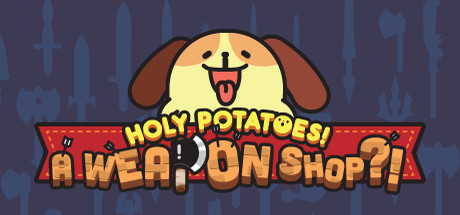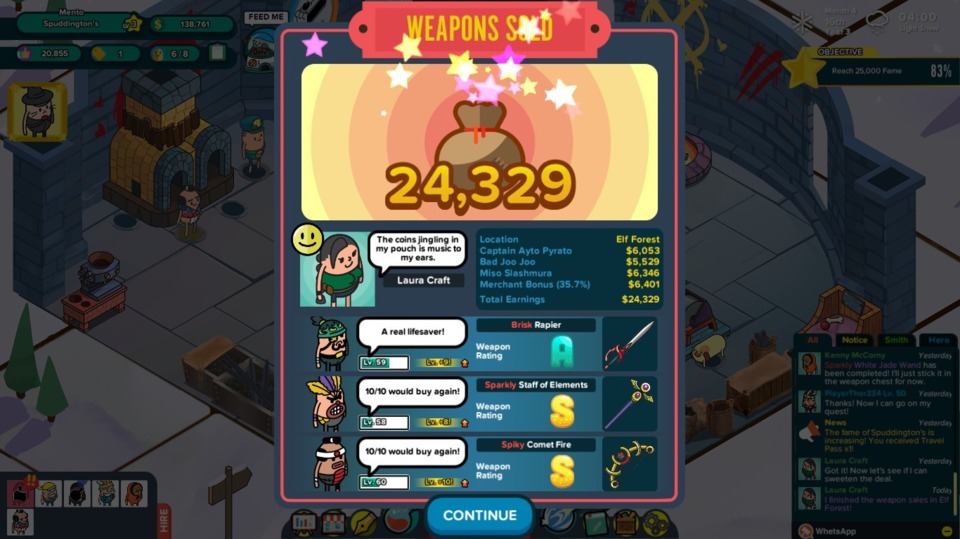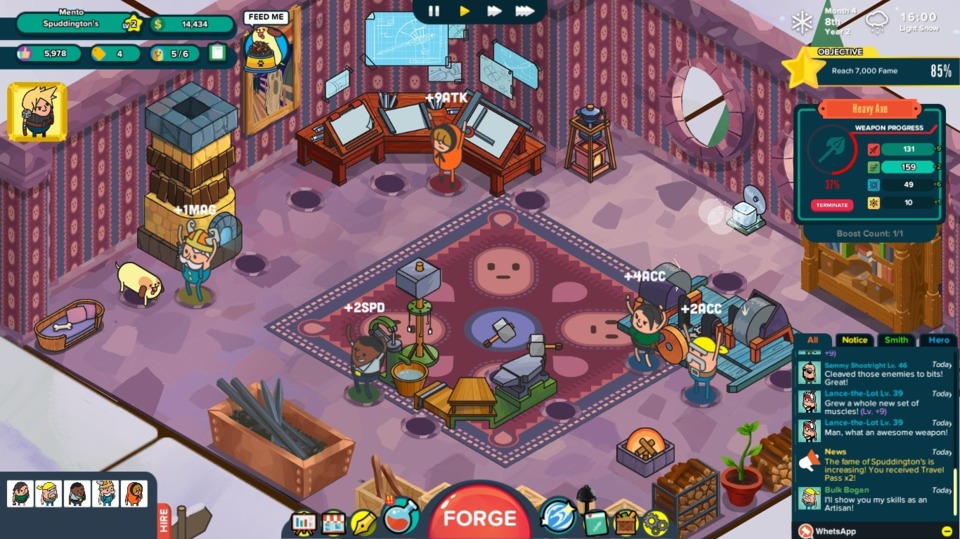Indie Game of the Week 86: Holy Potatoes! A Weapon Shop?!
By Mento 0 Comments

I've been curious about these Holy Potatoes! games for a while now, since new ones seem to keep popping up on Steam whenever my head is turned. The developers, Daylight Studios, are working on the fourth one now, so I figure these games must be doing something right. It turns out Holy Potatoes! A Weapon Shop?! is one of those real-time "plate-spinner" sims: the type of game that is half clicker, half real-time strategy, and usually prospers best on mobile devices, a la any number of games about serving food at restaurants or landing planes. I don't usually care for these games because they foment a lot of anxiety, which makes it all the stranger that I'm actually enjoying this one quite a bit.
The broad strokes are that the player-named character inherits a weaponsmithing company from his deceased grandfather and, thanks to the gentle cajoling of a shady "Agent 46" (the first of many references the game drops), learns how to hire employees and sell their deadly creations to wandering heroes. Specifically, you'll want to be making weapons that appeal most to the hero you have in mind: if they're a rogue type who prefers daggers with an emphasis on speed enhancements, for example, you can select one of your dagger blueprints and order your staff to the workstations that focus on the speed stat. The better-made and more germane the weapon, the more you earn, and that money goes directly towards paying your team's salaries and buying new upgrades for the smithy.

It's also one of those games with a long on-boarding period, though it's to its benefit. The way to craft a plate-spinner correctly is to ensure there's only so much the player has to worry about early on. Since everything's real-time (though you can pause time if you need to think), and there's a lot your smiths could be doing between weapon manufacturing, there's no small amount of stress involved if you're given too many options from the get go. However, the game also gets considerably more engaging the more options that become available. Sending smiths off to explore ruins for new components, having them train, send them to a weird dimension to research new weapon blueprints, switching their job classes which temporarily reduces their effectiveness as they start back at level 1 but often makes them more adept when working with multiple types of stat boost (there's four - strength, accuracy, speed, and magic); there's plenty to do when they aren't currently hammering away at the anvils. In addition to hunting out heroes to sell to, there are contracts, requests, "legendary" guests with their own special projects, legendary smiths that you can recruit, and so on. The actual crafting of weapons isn't all that compelling - once you have everyone in the right place and set them to the task, they slowly go at it automatically - but the frantic amount of running around and picking which of your dozen pressing concerns should be tackled next keeps this loop fresh.
To give you an example of the game's cycle in motion: You have a five spud crew, one of whom has stepped out to research a new weapon. Suddenly, you have a new request that needs completing in two days - a relatively short amount of time. You set your team to work immediately, moving two of them to the "primary" stat of the weapon that was requested and the other two to the "secondary" stat. You hit the boost button - you can do this once per weapon - to give yourself a massive boost to the primary. Your researcher shows up midway through construction, so you send them to bolster the primary in a 3:2 ratio. Once the weapon's done, you can enchant it for another big boost to its primary stat. The weapon you made meets the client's requirements, and you earn a substantial amount of fame - required for progress, as well as adding towards unlocking future legendary guests and smiths - and $tarch, the game's multi-purpose currency. After which, the status of one of your spuds dips to "stressed", so you send them on a nice vacation to recharge their batteries. Since you're a person down anyway, instead of making new weapons you send the rest of your team - bar one, since there always needs to be someone in the smithy - off to explore a recently unlocked node on the world map. Chances are they'll come back with more crafting components, more enchantment items, and more relics from which new blueprints can be researched.

In spite of all this talk about stress and frantic on-the-fly maneuvering, the game's debt deadlines don't loom menacingly on the horizon like they did in Recettear, and the difficulty curve is nice and gentle. As I said at the offset, I feel like this game was intended for a more casual mobile device audience, and honestly I'm not bugging: I don't do well with real-time strategy games of this sort usually, so the more accommodating pace is welcome. Throw in the game's lighthearted tone, reference humor, and endless barrage of potato puns - none of which are quite as awful as they sound, though hey it's me talking - and I can understand why it's become a popular series.
Rating: 4 out of 5.
| < Back to 85: World to the West | > Forward to 87: Skylar & Plux: Adventure on Clover Island |
